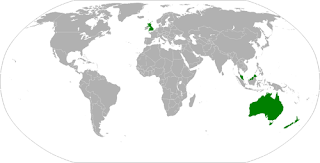The Five Power Defence Arrangements (FPDA) are a series of defence relationships established by a series of bilateral agreements between the United Kingdom, Australia, New Zealand, Malaysia and Singapore (all Commonwealth members) signed in 1971, whereby the five states will consult each other in the event of external aggression or threat of attack against Peninsular Malaysia or Singapore.
Origins
The FPDA was set up following the termination of the United Kingdom's defence guarantees of Malaysia and Singapore under the Anglo-Malayan Defence Agreement, as a result of the UK's decision in 1967 to withdraw its armed forces east of Suez. It is stated that "Under the Five Powers Defence Arrangements, the five powers (Australia, New Zealand, Malaysia, Singapore and the UK) undertook to consult "immediately" in the event or threat of an armed attack on Malaysia or Singapore "for the purpose of deciding what measures should be taken jointly or separately" in response. There is no specific commitment to intervene militarily." The FPDA provides for defence co-operation, and for an Integrated Air Defence System (IADS) for Peninsular Malaysia and Singapore based at RMAF Butterworth under the command of an Australian Air Vice-Marshal (2-star). RMAF Butterworth, until 1988 under the control of the Royal Australian Air Force, is now run by the Royal Malaysian Air Force but hosts rotating detachments of aircraft and personnel from all five countries.
In 1981, the five powers organised the first annual land and naval exercises. Since 1997, the naval and air exercises have been combined. In 2001, HQ IADS was redesignated Headquarters Integrated "Area" Defence System. It now has personnel from all three branches of the armed services, and co-ordinates the annual five-power naval and air exercises, while moving towards the fuller integration of land elements. An annual FPDA Defence Chiefs' Conference (FDCC) in hosted by either Malaysia or Singapore, and is the highest military professional forum of the FPDA and serves as an important platform for dialogue and exchange of views among the Defence Chiefs. There is also a Five Powers Defence Arrangements Ministerial Meeting (FDMM).
John Moore, then Minister for Defence of Australia said, "As an established multilateral security framework, the FPDA has a unique role in Asia. It is of strategic benefit to all member nations and, in Australia's view, to the wider Asia-Pacific region." Malaysia's CDF, former General (GEN) Tan Sri Dato' Sri Zulkifeli Bin Mohd Zin concurred: "We can help each other... and cooperate with one another."
40th Anniversary
On 1 November 2011, Singapore hosted FPDA's 40th anniversary celebrations, with the defence ministers, aircraft and servicemen from all five signatory countries converging on Changi Air Base (East) to participate in the event. Later, a gala dinner was hosted by Singapore's defence minister - Dr Ng Eng Hen at Singapore's Istana whereupon they called on the Prime Minister of Singapore - Mr Lee Hsien Loong to discuss a multitude of issues. Codenamed Exercise Bersama Lima, the three days joint exercise is expected to test the readiness and co-operation between all participating countries and concluded on 4 November 2011.
Personnel and facilities
The UK has the following personnel and facilities based in Malaysia and Singapore in support of the FPDA: a small Naval facility at Sembawang in Singapore and staff in the Integrated Area Defence System Headquarters (HQ IADS) at Butterworth in Malaysia. Staff at Sembawang total one Commander Royal Navy (who also serves as the Assistant Defence Attaché to Singapore), one Chief Petty Officer, one Petty officer and three Ministry of Defence civil servants. This has remained constant for the last 10 years. In HQ IADS, it is one Wing Commander, one Squadron Leader, one Lieutenant Commander, one Major and one other rank.
References
- Notes
External links
- Five Power Defence Arrangements
- The Five Power Defence Arrangements: If It Ain't Broke...
